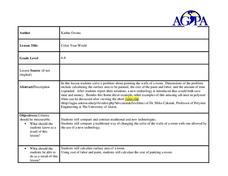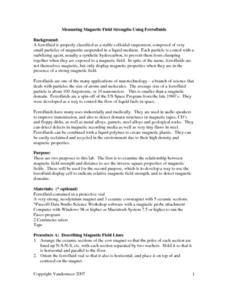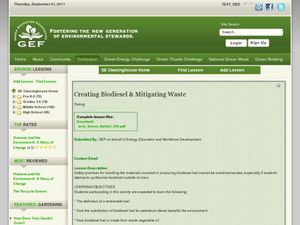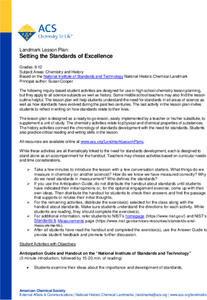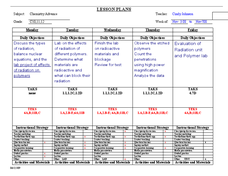Curated OER
Color Your World
Learners calculate the cost of painting a room. In this surface area lesson, students create a scale model from provided dimensions of a bedroom. Groups use area formulas to find square footage, from which materials and labor costs are...
Curated OER
Monomer and Polymer Chemistry
Students explain monomer/polymer chemistry of starches and sugars.
Curated OER
Measuring Magnetic Field Strengths Using Ferrofluids
Students explore the field of nanotechnology by examining magnetic field strength in ferrofluids. They use probes attached to a computer program to determine the relationship between magnetic field strength and magnetic field lines.
Virginia Department of Education
Soap, Slime, and Creative Chromatography
Do you think chromatography paper suffers from separation anxiety? Young chemists make soap, slime, silly putty, and experiment with chromatography in this lesson. The material includes clear instructions for each experiment along with...
Cornell University
The Making of Macromolecules
Compare and contrast macromolecules made from the same elements. Young scholars learn how the structure of a molecule has as much influence on a compound as the elements in the molecule. They experiment with molecular model kits to...
Curated OER
Plastic Polymers
Learners learn about plastic. In this plastic polymers lesson, students examine the properties of plastic, its variety of uses and how it is recycled.
Curated OER
How to Clean Up an Oil Slick
Students explore how an oil spill is contained and cleaned up. They investigate an oil absorbing polymer that is hydrophobic, absorbs up to 19 times its own weight in nonpolar liquids, floats on water, and can be reused or disposed of by...
Curated OER
The Four Groups of Biologically Important Compounds
This is not they typical set of teacher instructions. It is an organized chart of the important organic compounds. For each, the involved elements, the name of the building block monomers, the names of polymers, extra information, and a...
Curated OER
Creating Biodiesel and Mitigating Waste
Biotechnology pros produce their own biofuel using waste oil and fresh vegetable oil. They test the quality of their product using titration techniques and pH analysis. They write their observations and report their findings. Be aware...
Curated OER
Character Traits in Fables
Combining art, music, dance, and reading comprehension, this lesson is geared to reach all ability levels. After reading a variety of fables and discussing story elements and character traits, class members select a moral to use as the...
American Chemical Society
Setting the Standards of Excellence
A number doesn't have much meaning without a standard of reference. Learners read about the history of developing standards to measure chemical and physical properties and complete reading guides to process the information. They focus on...
Curated OER
WS 10.9 Plastic Recycling
In this recycling worksheet, students search for as many types of plastics categorized with the resin identification codes and fill in a chart for each plastic type. They identify the product name, the category the plastic is in, the...
Curated OER
Build a Better Bouncer
Students create the best bouncing ball possible using basic substances. In this chemistry lesson, students describe the effect of additives to polymers. They graph and analyze their results.
Curated OER
Using Plastics to Walk on Egg
Learners design shoes that can make them walk on eggs without breaking them. In this science lesson, students calculate pressure using force and area. They present their shoes model in class.
Curated OER
Condensation Polymerization: Preparation of Nylon 6/6
Students participate in a lab activity in which they synthesize nylon 6/6, calculate the percent yield by mass, identify the polymer as thermoplastic or thermoset, and determine the melting point, density and end-product use of the polymer.
Curated OER
Intrinsic Viscosity
Students treat a high molecular weight polyvinyl alcohol polymer with potassium periodate. They measure the viscosity of polyvinyl alcohols.
Lawrence Hall of Science
Photolithography
Examine the use of photolithography in the fabrication of circuit boards and other components. An advanced activity teaches pupils a process for transferring a pattern onto a surface. Using UV light and a light reactive substance,...
American Chemical Society
Man and Materials Through History
From the start of the Industrial Revolution, it only took 147 years for someone to invent plastic. This may seem like a long time, but in the history of inventing or discovering new materials, this is incredibly fast. An informative and...
Curated OER
Elastomers: The Best Bungee Cord
Students examine elastomeric polymers in a lab activity in which they design a bungee cord. Students must determine the tensile strength, percent elongation, and plot stress versus strain graphs for their experiments on rubber bands...
Curated OER
What Is Special About Polyethylene Food Storage Bags?
Learners participate in an investigation in which they compare a polyethylene bag designed for recycling or disposal with a polyethylene food storage bag. Students use hexane to determine the differences between the low density...
Curated OER
#21 Films, Fibers, and Solubility
Students are introduced to how the differences in solubility of materials are used in the manufacture of fibers and films. They are also introduced to the various processes used to make films and fibers. Pupils prepare fibers using wet...
Curated OER
Burlap Weaving Gone Wild
Explore art using fabric with this resource. Learners talk about weaving and create art work after discussing this important technique. This is a great way integrate art and history.
Curated OER
Critter? Growth
Learners identify and use the elements of the scientific inquiry to solve problems. They explain concepts about the structure and properties of matter. Pupils write an explanation of polymers and how the characteristic of polymers...
Curated OER
Nuclear Chemistry
Students write and balance nuclear equations. For this chemistry lesson, students identify materials that block radiation using polymers. They collect and analyze data from the experiment.


